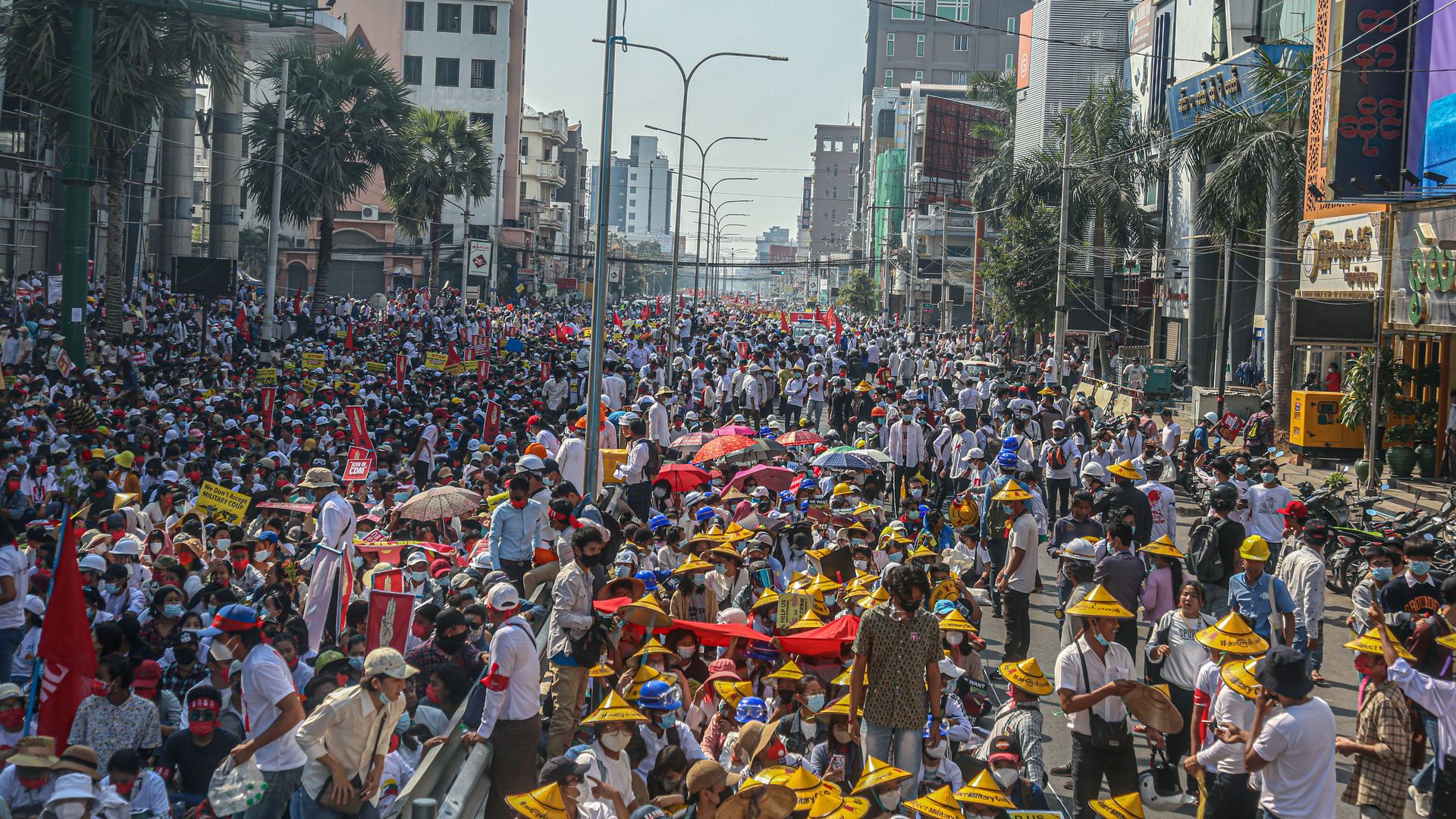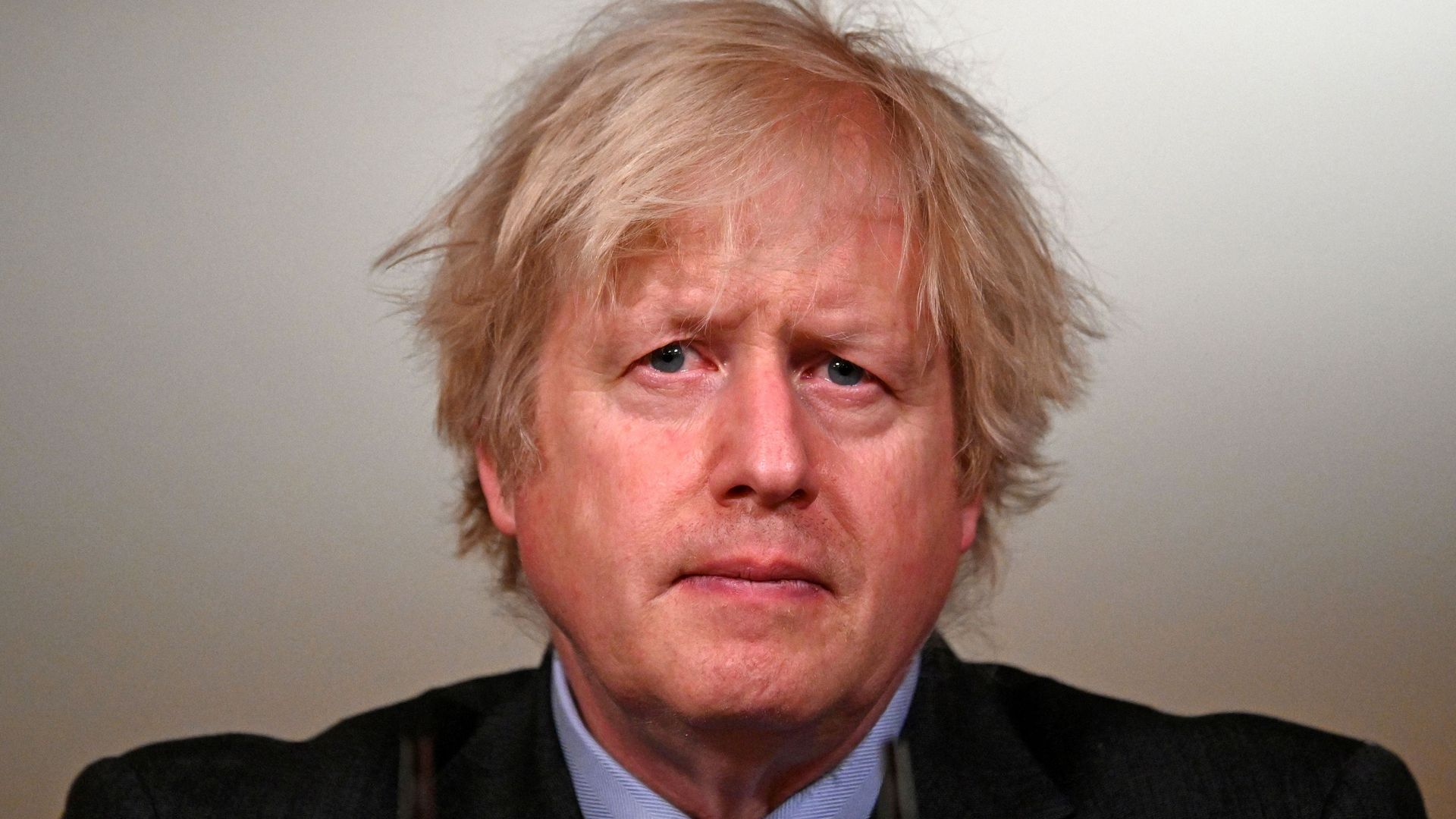| | | | | | | Presented By Raytheon Technologies | | | | Axios World | | By Dave Lawler ·Feb 22, 2021 | | Welcome back to Axios World. - We're starting tonight (1,790 words, 6½ minutes) with a look at two "forever wars." We've also got some hopeful news on the pandemic.
- New arrival? Sign up
| | | | | | 1 big thing: Biden's bad options in Afghanistan |  | | | Biden watches as the remains of a soldier killed in Afghanistan arrive at Dover Air Force Base in 2016. Photo: Alex Wong/Getty Images | | | | There are just 10 weeks left of America's war in Afghanistan — at least on paper. Why it matters: Donald Trump pledged a full troop withdrawal by May 1 as part of a deal struck one year ago with the Taliban. President Biden must now decide whether he can bear the risks of honoring it. The big picture: Under the deal, the Taliban promised to reduce violence, engage in peace talks with the Afghan government (which was not a party to the Trump-Taliban deal), and ensure that Afghanistan doesn't again become a haven for terror groups like al-Qaeda. - The Taliban has stopped targeting U.S. and NATO troops but continues to attack Afghan forces. Intra-Afghan peace talks have stalled, and the Taliban has refused to cut ties with al-Qaeda.
- Meanwhile, Trump pulled the U.S. troop count down to 2,500 from around 13,000 before leaving office. NATO allies have another 8,000 troops in the country.
- Flashback: The troop count rose as high as 100,000 under Barack Obama. The most prominent internal opponent of Obama's surge was Biden, who has long argued for a smaller operation focused on counter-terrorism.
The state of play: The Pentagon has accused the Taliban of shirking its commitments but says the deal remains operative. Biden also kept on the man who negotiated it, Zalmay Khalilzad. - NATO hasn't decided whether its troops will remain beyond May, Secretary-General Jens Stoltenberg said last week. The alliance's decision will be closely linked to Biden's.
Biden has three broad choices. 1. Get out on time. - Exiting entirely before May could lead to the "collapse of the Afghan state" and "renewed civil war," according to a recent report from the Afghan Study Group, a congressionally appointed commission led by former Joint Chiefs chairman Joe Dunford.
- The commission also warned that Afghanistan could again become a base for terror groups to plot against the U.S. within "18 months to three years."
- If Biden finally ends America's war in Afghanistan, he could be forced to watch cities fall to the Taliban and hard-won freedoms for Afghan women erased.
- The argument for fully withdrawing is that there's never going to be a happy ending to this war, and 20 years is long enough.
2. Pull out of the deal and return to a "conditions-based" approach. - The Taliban would likely resume attacks against U.S. and NATO forces and withdraw entirely from the intra-Afghan peace process.
- That would leave the U.S. once again facing an open-ended commitment to Afghanistan and the prospect of sending additional troops if conditions deteriorate.
- The argument for this approach is that the Taliban has no intention of holding up their end of the deal, and America has put too much into the fight to see its gains wiped out.
3. Seek an extension to the deadline and put renewed emphasis on the peace process. - That would buy Biden time and give the intra-Afghan talks some chance of success.
- But it would require the Taliban to agree to an extension just as their primary objective — the removal of foreign troops from Afghanistan — is coming into focus.
|     | | | | | | 2. Macron searches for a way out of the Sahel |  | | | Macron takes part in a ceremony in Niger following the massacre of 71 Nigerien troops in 2019. Photo: Ludovic Marin/Pool/AFP via Getty | | | | French President Emmanuel Macron is attempting to avoid a "forever war" of his own in Africa's Sahel region, where French troops have been battling Islamist fighters since 2013 in support of fragile governments in Burkina Faso, Mali and Niger. Why it matters: Macron increased France's troop presence to 5,100 last year, but had floated the idea of sharply reducing the French commitment to a campaign that's increasingly unpopular at home. Instead, he announced at a summit with regional leaders last week that he'd hold steady — for now. - "Our aim is not to fight against all the groups that might exist in the region. It would be infinite war. Our aim is to fight against identified terrorist groups who threaten the stability of the region's sovereign states and the security of its populations," he said.
- Yes, but: Macron will have a difficult time extracting France from the conflict, and not just because local governments are unlikely to be able to maintain security themselves for some time.
- Bernard Émié, who runs the French foreign intelligence agency, recently warned that groups operating in Mali were the "direct heirs to Osama bin Laden" and could eventually attack Europe.
The state of play: For every fighter taken out by France, more seem to be recruited from impoverished villages where few other opportunities exist, the Economist notes. - It's proving impossible to improve development without improving security, and to improve security without improving development. "And France needs to show progress, or at least find an honorable way out, in case public support falters."
The bottom line: That all sounds deeply familiar. Macron will likely find a sympathetic ear in the White House if he wants to talk it over. |     | | | | | | 3. Global news roundup |  | | | Taking to the streets today in Mandalay, Myanmar. Photo: Kaung Zaw Hein/SOPA Images/LightRocket via Getty | | | | 1. Myanmar today saw the largest protests since the coup on Feb. 1, even after the military threatened that "confrontation" would lead to "loss of life." - Shops and factories around the country were closed as workers observed a national strike calling for the restoration of democracy. Two protesters were killed over the weekend.
2. Italy's ambassador to the Democratic Republic of Congo was killed today after his convoy was ambushed in the east of the country. - The passengers were reportedly taken as captives into Virunga National Park. Park rangers managed to free some of the captives, but Ambassador Luca Attanasio was killed along with his driver and bodyguard.
3. The International Atomic Energy Agency reached an agreement with Iran on Sunday that allows UN inspectors to continue routine monitoring of Iran's nuclear facilities for up to 3 months, while suspending more intensive inspections. - As part of the compromise, Iran will not fully implement a law that was to go into effect tomorrow curtailing the inspectors' access.
- Why it matters: The understanding buys more time for more diplomacy between the U.S. and Iran. The Biden administration announced last week it was prepared to meet with Iran and other world powers to discuss paths back to the 2015 nuclear deal.
4. Georgia has a new prime minister. Irakli Garibashvili, who previously held the post from 2013-2015, replaces Giorgi Gakharia, who resigned after an arrest warrant was issued, over his objections, against the chairman of the leading opposition party. - The backstory: Georgia's politics are hyperpolarized between the ruling Georgian Dream party, founded by billionaire Bidzina Ivanishvili, and the United National Movement (UNM), founded by exiled former President Mikheil Saakashvili.
- UNM rejected the results of October's election, which gave Georgian Dream a majority. Then came the arrest warrant against UNM Chairman Nika Melia, who barricaded himself inside party headquarters.
- He was charged with fomenting violence during 2019 protests against the decision by Georgian Dream — which has pursued normalization with Moscow — to invite a Russian politician to address Parliament. The order to arrest him was postponed after Gakharia resigned.
|     | | | | | | A message from Raytheon Technologies | | Raytheon Technologies is creating intelligent space technologies | | |  | | | | From missile warning to weather information, Raytheon Technologies is creating space-based technologies that are essential for global commerce, scientific discovery and national security. That's the future of aerospace and defense. Learn more at RTX.com. | | | | | | 4. State of the outbreak: Skipping the line |  Data: Our World in Data; Chart: Axios Visuals 1. The health ministers in Argentina and Peru both resigned in recent days over allegations that they allowed well-connected individuals to jump the line for vaccines. - What to watch: Vaccine corruption is likely to be a running narrative in the coming months.
2. Israel plans to allow people who have been fully vaccinated to download a certificate allowing them to attend sporting events, fly abroad and go to gyms. - What to watch: A few months ago, "Covid passports" — which were supposed to open work and travel to those with antibodies — were the topic du jour. They never really caught on. Now the question is to what extent societies will be divided based on vaccination status.
3. Case counts continue to fall in just about every region of the world. - This pandemic has taught us that all good news is reversible. But there's a lot more reason for optimism than there was a month or two ago.
|     | | | | | | 5. How the vaccine rollouts stack up |  51% of Israelis have now received at least one vaccine dose, with the Seychelles, UAE, U.K., Bahrain, Chile and U.S. (13%) having the next highest rates in the world. The flipside: The EU (4%), Canada (3%) and Japan (0%) are lagging far behind, making clear that the gap isn't driven entirely by wealth. Other factors include: - The speed with which countries purchased and approved vaccines. The EU clearly proceeded more cautiously than the U.K., for example, while Israel paid a premium and promised valuable data to get Pfizer's vaccine early.
- The capacity to manufacture doses domestically. Canada purchased even more doses relative to its population than the U.S. but is reliant on imports that have been slow to arrive.
- The sense of urgency to ramp up vaccinations. Japan and South Korea were hit less hard by the pandemic than the U.S. and seem less driven to ramp up vaccinations.
The state of play: That also appears to be the case in China. While deliveries of Chinese vaccines are making headlines around the world, less than 3% of the domestic population has been vaccinated. - Home-grown vaccines have yet to be approved for the elderly, production has been slower than hoped, and Beijing is the only city with an active mass vaccination campaign, per the Economist.
- That's hardly cause for panic in a country that has successfully contained the virus, but it could delay the process of reopening the country to the world.
Go deeper: U.S. vaccine rollout among the best in the world |     | | | | | | 6. An American perspective on the British lockdown |  | | | Boris Johnson today. Barbershops remain closed during the U.K. lockdown. Photo: Leon Neal/Pool/AFP via Getty Images | | | | U.K. Prime Minister Boris Johnson released a road map out of England's strict lockdown today, including plans to reopen schools (March 8), nonessential shops (April 12), indoor dining (May 17) and large indoor venues like nightclubs (June 21), all subject to change based on the data. - Weddings and funerals will be capped at six guests until April, 15 until May and 30 until June, at which point such caps will be lifted and normal life should just about return.
- Up to six people from different households — or two complete households with a total of more than six people — will be able to socialize outside as of March 29. As of May, such groups will be allowed to mix indoors.
- You can rent an Airbnb in April, but only if it has a private entrance and bathroom. Hotels can reopen in May.
That's just a broad overview, beyond which there are a number of more specific policies. - Past policy announcements in the U.K. have been followed by controversies over whether, for example, a family out walking their dog can be joined by a relative from a different household.
My thought bubble: This all makes for strange reading for an American, and not just because we've never had a nationwide lockdown. I've only been aware of two pandemic policy variables for months now: - Are schools open?
- How about indoor dining?
The bottom line: In the U.S., it seems that people are mainly determining for themselves what they're comfortable doing. In the U.K., the government is playing a far more active role in drawing those lines. |     | | | | | | 7. Stories we're watching |  | | | Biking in Beijing. Photo: Kevin Frayer/Getty Images | | | - Netanyahu corruption hearings pushed to after Israel's election
- Biden's Munich speech
- G7 leaders promise "turning point for multilateralism"
- Monsoon floods hit Indonesian capital
- Israel sounds alarm after U.S. backs nuclear talks with Iran
- Brazil investors eye the worst-case scenario
- U.K. speeds up vaccine timeline
Quoted: "The House therefore recognizes that a genocide is currently being carried out by the People's Republic of China… and calls upon the International Olympic Committee to move the 2022 Olympic games if the Chinese government continues this genocide." — From a motion that passed Canada's Parliament 266-0 this evening, with Prime Minister Justin Trudeau's government abstaining. |     | | | | | | A message from Raytheon Technologies | | Raytheon Technologies is creating intelligent space technologies | | |  | | | | From missile warning to weather information, Raytheon Technologies is creating space-based technologies that are essential for global commerce, scientific discovery and national security. That's the future of aerospace and defense. Learn more at RTX.com. | | | | | | Axios thanks our partners for supporting our newsletters.
Sponsorship has no influence on editorial content. Axios, 3100 Clarendon Blvd, Suite 1300, Arlington VA 22201 | | | You received this email because you signed up for newsletters from Axios.
Change your preferences or unsubscribe here. | | | Was this email forwarded to you?
Sign up now to get Axios in your inbox. | | | | Follow Axios on social media:    | | | | | |










No comments:
Post a Comment